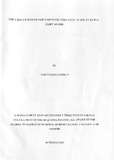| dc.description.abstract | The strategic management process involves not only strategy formulation but also
strategy implementation. The strategies formulated are actualized in the implementation
of the strategic plan. Much of the time implementation of strategic plans poses the
greatest challenge in strategic management as this, by and large, would determine the
actual outcomes and results of the firm’s strategic plan. It therefore appears at the end of
the strategic planning processes whose other ingredients include idea conception in the
mission and vision, tactical plans and operational objectives. Effective implementation of
strategic plan does not guarantee results as planned. The strategy itself as well as the
implementers and the implementation process can influence the outcome. This study
sought to establish the challenges faced by Kenya Dairy Board (KDB) in implementing
strategic plans. A case study of KDB was used to achieve the research objective. Both
primary and secondary data related to the area of study were used. To gather primary
data, the researcher relied on the interview guide administered to the chief executive
officer and the managers. Content analysis of the interviewee responses was applied. In
conclusion and from the findings therefore policies and procedures, tactical and
operational plans, resource allocation, globalization forces and power and politics were
seen as the main challenges faced by KDB in implementing 2005 to 2009 strategic plan.
Resource allocation was seen as the overriding challenge due to the fact that as an
industry regulator in a market economy, it relies on limited grants from the exchequer
and it in turn has an unlimited mandate as the industry growth rate was very high. The
industry is rural and suburban in nature. It is recommended that a research be carried out
on management responses to the challenges noted with a view to establishing whether
KDB can generate adequate revenue from operating within its mandate and cease relying
100 % on grants from the exchequer. In addition, KDB and the office of the prime
minister that currently reviews the results of the performance contacts should devise a
more specific, measurable, and achievable or result oriented and timely (SMART) criteria
for evaluating performance on non financial strategic objectives. Breaking objectives by
activity, time and staff category when crafting the plan can eliminate uncertainty during
evaluation. | en |

